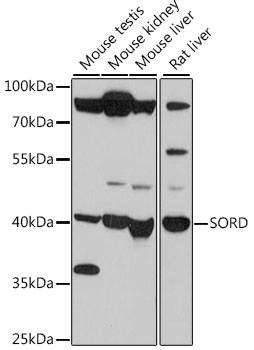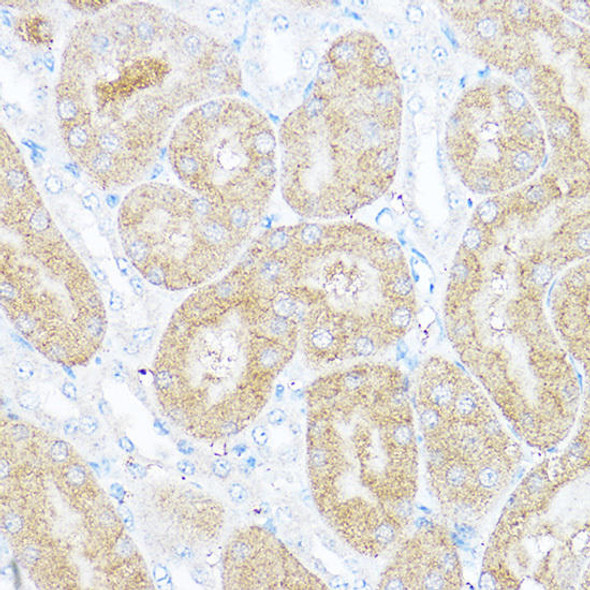Description
Anti-SORD Antibody (CAB15727)
The SORD Polyclonal Antibody (CAB15727) is designed for research involving SORD, a key enzyme involved in the metabolism of sorbitol. The antibody, raised in rabbits, is highly reactive with human samples and is validated for use in various applications, including Western blot and immunohistochemistry. It specifically binds to the SORD protein, allowing for precise detection and analysis in different cell types.SORD, also known as sorbitol dehydrogenase, plays a crucial role in the polyol pathway, which is important for glucose metabolism and osmoregulation in cells.
Dysregulation of SORD has been linked to various diseases, including diabetes, diabetic complications, and neurodegenerative disorders. Understanding the function and regulation of SORD is essential for investigating its potential as a therapeutic target in these conditions.Overall, the SORD Polyclonal Antibody is a valuable tool for researchers studying the role of SORD in cellular metabolism and its implications in various diseases. Its high specificity and sensitivity make it ideal for advancing research in biochemistry, diabetes, and related fields.
| Antibody Name: | Anti-SORD Antibody |
| Antibody SKU: | CAB15727 |
| Antibody Size: | 20uL, 50uL, 100uL |
| Application: | WB |
| Reactivity: | Human, Mouse, Rat |
| Host Species: | Rabbit |
| Immunogen: | Recombinant fusion protein containing a sequence corresponding to amino acids 1-357 of human SORD (NP_003095.2). |
| Application: | WB |
| Recommended Dilution: | WB 1:500 - 1:2000 |
| Reactivity: | Human, Mouse, Rat |
| Positive Samples: | Mouse testis, Mouse kidney, Mouse liver, Rat liver |
| Immunogen: | Recombinant fusion protein containing a sequence corresponding to amino acids 1-357 of human SORD (NP_003095.2). |
| Purification Method: | Affinity purification |
| Storage Buffer: | Store at -20'C. Avoid freeze / thaw cycles. Buffer: PBS with 0.02% sodium azide, 50% glycerol, pH7.3. |
| Isotype: | IgG |
| Sequence: | MAAA AKPN NLSL VVHG PGDL RLEN YPIP EPGP NEVL LRMH SVGI CGSD VHYW EYGR IGNF IVKK PMVL GHEA SGTV EKVG SSVK HLKP GDRV AIEP GAPR ENDE FCKM GRYN LSPS IFFC ATPP DDGN LCRF YKHN AAFC YKLP DNVT FEEG ALIE PLSV GIHA CRRG GVTL GHKV LVCG AGPI GMVT LLVA KAMG AAQV VVTD LSAT RLSK AKEI GADL VLQI SKES PQEI ARKV EGQL GCKP EVTI ECTG AEAS IQAG IYAT RSGG NLVL VGLG SEMT TVPL LHAA IREV DIKG VFRY CNTW PVAI SMLA SKSV NVKP LVTH RFPL EKAL EAFE TFKK GLGL KIML KCDP SDQN P |
| Gene ID: | 6652 |
| Uniprot: | Q00796 |
| Cellular Location: | Cell projection, Mitochondrion membrane, Peripheral membrane protein, cilium, flagellum |
| Calculated MW: | 10kDa/38kDa |
| Observed MW: | 38kDa |
| Synonyms: | SORD, HEL-S-95n, SORD1 |
| Background: | Sorbitol dehydrogenase (SORD; EC 1.1.1.14) catalyzes the interconversion of polyols and their corresponding ketoses, and together with aldose reductase (ALDR1; MIM 103880), makes up the sorbitol pathway that is believed to play an important role in the development of diabetic complications (summarized by Carr and Markham, 1995 [PubMed 8535074]). The first reaction of the pathway (also called the polyol pathway) is the reduction of glucose to sorbitol by ALDR1 with NADPH as the cofactor. SORD then oxidizes the sorbitol to fructose using NAD(+) cofactor. |
| UniProt Protein Function: | SORD: Converts sorbitol to fructose. Part of the polyol pathway that plays an important role in sperm physiology. May play a role in the sperm motility by providing an energetic source for sperm. Belongs to the zinc-containing alcohol dehydrogenase family. |
| UniProt Protein Details: | Protein type:EC 1.1.1.14; Oxidoreductase; Carbohydrate Metabolism - fructose and mannose Chromosomal Location of Human Ortholog: 15q15.3 Cellular Component: extracellular space; membrane; mitochondrial membrane Molecular Function:zinc ion binding; L-iditol 2-dehydrogenase activity; carbohydrate binding; NAD binding Biological Process: sperm motility; L-xylitol metabolic process; L-xylitol catabolic process; glucose metabolic process; fructose biosynthetic process; sorbitol catabolic process |
| NCBI Summary: | Sorbitol dehydrogenase (SORD; EC 1.1.1.14) catalyzes the interconversion of polyols and their corresponding ketoses, and together with aldose reductase (ALDR1; MIM 103880), makes up the sorbitol pathway that is believed to play an important role in the development of diabetic complications (summarized by Carr and Markham, 1995 [PubMed 8535074]). The first reaction of the pathway (also called the polyol pathway) is the reduction of glucose to sorbitol by ALDR1 with NADPH as the cofactor. SORD then oxidizes the sorbitol to fructose using NAD(+) cofactor.[supplied by OMIM, Jul 2010] |
| UniProt Code: | Q00796 |
| NCBI GenInfo Identifier: | 292495088 |
| NCBI Gene ID: | 6652 |
| NCBI Accession: | Q00796.4 |
| UniProt Related Accession: | Q00796 |
| Molecular Weight: | |
| NCBI Full Name: | Sorbitol dehydrogenase |
| NCBI Synonym Full Names: | sorbitol dehydrogenase |
| NCBI Official Symbol: | SORD |
| NCBI Official Synonym Symbols: | SORD1; HEL-S-95n |
| NCBI Protein Information: | sorbitol dehydrogenase |
| UniProt Protein Name: | Sorbitol dehydrogenase |
| UniProt Synonym Protein Names: | L-iditol 2-dehydrogenase |
| Protein Family: | Serine 3-dehydrogenase |
| UniProt Gene Name: | SORD |
| UniProt Entry Name: | DHSO_HUMAN |









